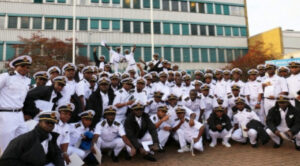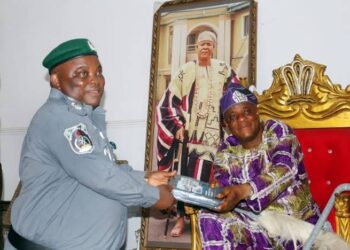By Joshua Yousouph
Following the plights of Nigerian unemployed seafarers, stakeholders in the Maritime industry have given real reasons the National Seafarers Development Programme (NSDP) set up by the Nigerian Maritime Administration and Safety Agency (NIMASA) has not been able to achieve its set objectives.

The Seafarers Development Programme is a programme created by the Nigerian Maritime Administration and Safety Agency (NIMASA) to address the dearth of trained and certified seafarers in the Nigerian maritime industry. So far, more than 2,000 Nigerians have been trained since its commencement in 2008.
Recently, NIMASA deployed about 200 cadets to China to be trained as seafarers. But however, there have been reports from some of the stranded cadets sharing their ordeals on how NIMASA allegedly abandoned them with little or no means of survival.
Speaking with Shipping Position Daily last week, the Secretary-General of Merchant Seafarers of Nigeria (MESAN), Captain Alfred Oniye, noted that the NSDP has not been able to solve any problem, but rather created the problem of seafarers’ unemployment in Nigeria. He noted that 95 per cent of the over 3,000 cadets trained under NIMASA’s NSDP are currently without jobs.
Oniye blamed piracy on Nigerian waters for the high rate of unemployed NSDP Cadets. He said many of the first batches of NSDP cadets trained by NIMASA who were mostly ex-militants have decided to go back to the creeks, practising as pirates in order to make ends meet.
He however advised NIMASA to focus on the development of indigenous maritime institutions by acquiring more training vessels and simulators for the development of Nigerian seafarers, rather than spending huge revenue on foreign institutions and the economy.
In his words: “Before NIMASA started the NSDP taking cadets out of the country for training, we already had over 70 per cent of seafarers who were jobless. NIMASA now added to the problem by training more seafarers outside of the country. They claim that they have trained close to 3, 000 cadets, but they have not given five per cent of them a job. NIMASA is saying they have given 800 of the beneficiaries of the NSDP job, but I am challenging them that it is a lie. They should publish the names of the seafarers they have given jobs and the company they work with, to prove us wrong” Oniye said.
Also speaking, the President of Maritime Professionals Forum, Captain Olusegun Akanbi noted that NSPD needs to be evaluated. He added that Nigerian seafarers are lacking operational competencies which imply on-the-job specialized training on vessels. According to him, this deficiency is the cause of foreign dominance on Nigerian waters.
Akanbi however advised that NIMASA should rather train existing seafarers to the next cadre in operational competencies, rather than bringing up and training fresh cadets who will still get stuck in the status quo. He noted that mentorship programmes and succession plans should be created for Nigerian seafarers where they can understudy the foreigners currently on the job to gain competence and experience.
According to him, “the NSDP is for seafarers’ development and not just a Cadetship development programme. So a whole lot of people should be a beneficiary of NSDP. They have done so well on the aspect of cadets by training them, but it has not still solved our problems. They are looking for opportunities for their sea time but some Captain has got a lot of sea time. The problem NIMASA is facing is that they trained them out of school, but there is no sea time. They should have trained the existing seafarers and moved them from their current stage to a step to their destination. They rather abandoned them and went to pick up fresh cadets who later get stuck with other Nigerian seafarers.
“They need to evaluate the NSDP. What Nigerians are lacking that is making foreigners dominate our waters is operational competence. We need specific operational competencies when they would train them properly. It is not the CoC, CoC has been settled and it is not a problem. Operational competency implies on-the-job training on how to handle different kinds of ships which may include tankers, bulk carriers, life support, drilling, underwater pipe laying and others. Those are specialized training”.
On his part, a frontline seafarer, Captain Williams Ogunsakin lamented the lack of training vessels in Nigeria, adding that Cadets are expected to have their sea time on their nation’s flagged ship which has made sea time opportunities difficult for many NSDP cadets. He said the lower cadre is already saturated and until existing seafarers move to the next rung, there will be unemployment amongst Nigerian seafarers.
Ogunsakin however urged the government to put up a policy and force all local and foreign ships on Nigerian waters to absorb Nigerian cadets. He also advised that efforts should be made to ensure that Nigerian Seafaring certificates are recognized and allowed to work on these vessels.
Read Also: Buhari Welcomes Berthing Of First Ship At Lekki Deep Sea Port
On his part, a former President of the National Association of Master Mariners (NAMM), Captain Adewale Ishola told Shipping Position Daily that Nigerian seafarers need to move forward from the vocational level to the management level. He added that NIMASA has realized their shortcomings on the NSDP and he is optimistic that things will improve for Nigerian Seafarers soonest.
“We were part of the initial stage when Dr Dosunmu introduced it. We went round sensitizing the different zones of the nation. We were expecting 30 cadets from each state to be partly funded by the 36 states and NIMASA on a 60:40 ratio. But indirectly, it is now 100 per cent NIMASA. We can see that NIMASA has a lot of challenges. They have other things to face. Recently, they sent about 200 cadets to China. But I think over the years, they have seen the shortcomings and mistakes. The new set that has gone now is having a total package that is it is not only the academic session, they will also do their sea time there and take their professional examination. Things are improving.
“The initial level is operational level. We need to move forward to the management level when they will become Chief Officer, Second Engineer, Chief Engineer, and then Captains. That level has to move forward from vocational level to management level” Ishola said.
Kindly like us on Facebook















